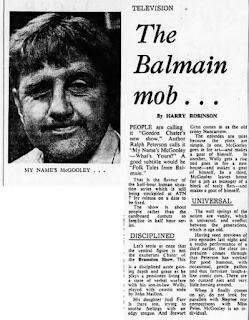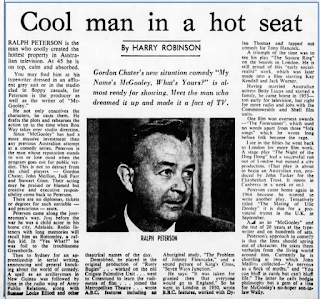The Valiant July 1956 - see here.
Elizabeth Refuses Sept 1956.
Winter
Cruise by Somerset Maugham. Oct 1956. Cast: John Brunskill, Queenie
Ashton, John Bonney, Charles Tasman, Lou Vernon. See article below).
'The Wraith' - Joan Lord, Norman Cull,
Leonard Bullen;
'St Joan' - Ron Haddrick, Roger MacDougall, Zoe Caldwell
[no photograph]; (date?? Sounds 1960s)
'Act Of Treason' - Brian James, Edward Brayshaw, Frank
Thring, Wynn Roberts;
'In the Zone' - Owen Weingott, John Bluthal,
Bruce Beeby, Richard Meikle, Keith Buckley, Bruce Wishart;
'Distress
Phase' - John Cockcroft and a flying crew;
'The Rose & Crown' -
Ethel Lang, David Butler, Dorothy Whiteley, Lou Vernon, Maiva Drummond,
Frances Worthington, Keith Buckley
The NAA has a photo of some productions (not online). See here.
Kay Kinnane of the Children's Dept visited the US in 1955 to study TV and attend workshops.
Rudy Bretz started holding workshops 23 April 1956
through to May. Bretz had worked in Germany, Canada and America and was
an expert in TV. He tried out 40 different idea including play extras.
See below. He did it again in June - her's a picture of him.
Workshops covered all aspects of television. See this article from Sept 1956. Picture of dancing here.
ABC weeklyVol. 18 No. 24 (16 June 1956) Browse this collection
The Magic of Television A
leading
U.S. television consultant, RUDY BRETZ outlines here some of TV's
features. He entered the field in 1939 and has advised the Canadian
Broadcast Corporation, various U.S. television stations, the German
Broadcast Corporation and others. He is now in Australia in a similar
capacity and has conducted a number of TV workshops for the A.B.C.
''TELEVISION in the United States has become a tremendous thing and
quite frightening, not only to the people in America, but to people all
over the world. It has been watched very closely and the stories and the
various sur-veys that have been made about the effects of television
on the Ameri can home, have been rather start- ling and have given
pause to in- telligent people wherever they have [been considering the
establishment iof television in other countries. I have lived through
this develop- ment of television. Being a tele- r vision man I have been
very in- timately involved in it, but I have '> also seen it from
the other side, ihaving a family of five children and a television set
in the home. I know what it is when they say a child, if allowed, will
watch the television screen more hours per day that he will spend in the
class- room. Another survey totalled all the hours the family would
spend at various occupations and found out that the total number of
hours a week spent by the family watching the television screen was much
more than the total number of hours a week spent in making a living.
OUT the home which is disrupted by the tele- vision receiver is the home
which is not too well organised and likely to be disrupted anyhow. T
have found that families who do not want the children watching
television all the time prefer them to watch between certain hours,
for- bid them to watch certain program- mes and guide them in their
view- ing by watching the programmes their children are looking at. If
the home is run properly tele- vision is no great problem. Television on
the other hand has many great values for children. I think it has done a
great deal to advance the spread of culture in America. For example,
there are people in America today who have seen ballet dancing for the
first time on tele- vision. Opera is another example. Then there is
Charles Laughton and his readings from the Bible and from great
literature, and Dr. Frank Baxter, a university professor in California,
who did a programme called Shakespeare on television. This became
immensely popular and had the effect of practically wiping c’ean the
library shelves of Shakes- peare books each time the pro- gramme was
done in any given com- munity. The effect is that a tremendous number of
people do make contactwith fine things in addition to, of course, the
tremendous amount of contact that they get on television with light
entertainment, which is inevitable.
O' NE of the questions which is
asked me very often about television by Aus- tralians is: What is it
going to be like? Is it going to look like a film in the home? Are we
just going to have films? Is it possible to just take an ordinary film
and run it on the television system and view it in the home, and is that
what we should expect, or is television going to be somehow more like
radio? Will we watch radio performers reading their scripts or something
of that sort? Actually, it will be a little of both. It will be like
radio in that it is broadcast; it will be like film be- cause it is a
series of moving pic- tures. and it looks like film because you see it
on a two-dimensional screen. . . .
However, the-'usual kind of.
things you get on films are quite different from what will be available
on tele- vision and I must make the dis- tinction here between real live
tele- vision and film television which is simply the screening of a
film. It is possible for a station, of course, to do nothing but lun
films, but there are not enough films avail- able for television in
Australia to run a station for very many weeks, and the amount of films
it is pos- sible to import is also relatively small. So the great
majority of program- ming on the TV stations in Aus- tralia is going to
be live, which means Australian, of couise. There is a great advantage
to live television over films. It is a magical thing to look at that
screen at home and know that you are seeing some- thing which is
happening at that very moment in a distant place. It has been found in
the latest surveys that the longer you have a set the more it is used.
Of course, in radio we have the feeling that what you hear is origina-
ting at the time you hear it, but see- ing at a distance is much more
im- portant than merely hearing at a distance. The sense of sight is so
much more important than the sense of sound. Psychologists tell us that
ninety per cent of our perceptions come through the eyes, five per cent
through the ears, and the other five per cent through the minor senses.
And when you are working with a visual medium it is a much more
important medium to the observer to the audience. Vi' 7 E in television
pro- ™ grammes find the most interesting programmes are those that are
real, made with real people, doing real things. For example, if you have
somebody in the studio and you ask him a ques- tion and he doesn't know
what the question is going to be, as in a typical panel or quiz
programme, and you watch the face on the television screen as he is
thinking up his answer, you have something that is real. It is quite
different from the make-believe or the illusion of a situation that is
the usual thing in a film. A film is something which is con- structed,
whereas television is some- thing which is transmitted. It is a direct
transmission of reality. In programming, we organise the reality to make
it flow, make it inter- esting. The TV writer does not necessarily
write words when he writes the tele- vision show, unless, of coiuse, lie
is writing a drama, in which case it is very, very similar to the
medium of film. . . , With all the other types of tele- vision
programmes besides drama, quiz programmes, discussions, talks. ,
interviews, sports, the TV wiiter does not write script. In TV we shall
utilise real people from all walks of life in Australia
"IMAGINATIVE" A.B.C's TV Workshop
A
BOUT 40 programme ideas were tested out at the advanced TV training
workshop which Rudy Bretz conducted recently tor the A.B.C. in Sydney.
“Most of these programmes were of professional standard, the quality
equalling that seen on television stations almost anywhere. The A.B.C.
will undoubtedly use them later,” said Mr. Bretz, adding that he was
very pleased with the results as the workshop had trained per- sonnel
and produced a number of quality TV programmes. “In the exercises we
changed the crew so that everyone had a chance to direct, to operate the
cameras and to appear before them,” he ex- plained. “In the first two
weeks the workshop members did everything— we used no regular cameramen.
So the students learned all the problems involved. “All attending the
workshop have been very imaginative and en- thusiastic. They have been
‘all out. “All were well based in the con- tent of their programmes.
I’ve never had in a workshop so many students who were so well grounded
in their individual fields—sport, drama, light entertainment and so on.
OF course” Mr. Bretz went on, “the trans* fer from sound radio to
televisior technique is not easy at first. Sounc radio has a much
quicker pace than television. The important thing in TV is relaxing and
taking it quietly. It is not what you say but what you do that matters
most. A television programme is built out of people and things and
places—not out o words, and certainly not out o scripts. A ..
“The
TV writer does not write words unless he is a dramatic writer, He plans
action and situations. “The most terrible crime on IV 1S to be dull and
the best possible way to be dill on TV is to be formal. As soon as you
give a person a script he ceases to be himself. The performer on
television is not facing an audience. There may, of course, be a total
of millions watching him, but they are formed of small groups in hr ncs.
It is most important that the television personality coming in lo the
home be a person and not just a body with a voice.” At the end of the
workshop Mr Bretz himself directed one produc- tion which involved
several tech- niques. It was a Children’s Session programme in which he
used couple of silhouette puppets and a couple of puppets with fully
ani- mated mouths that talk on the tele- vision screen next to the
compere The compere had no material —he ad libbed with the pU Among
other programmes done by the workshop were a spots demonstrating
skin-diving with al the necessary apparatus news, variety, light
entertainment, and several excerpts from plays.




























